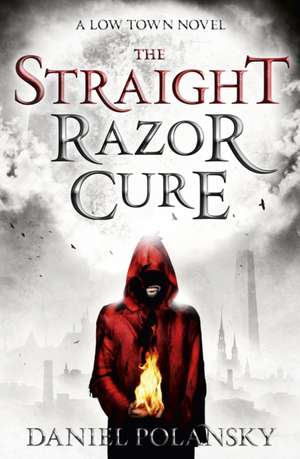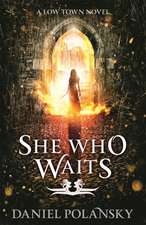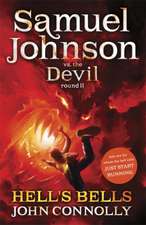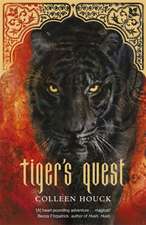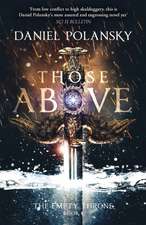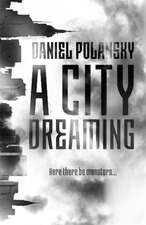Low Town: The Straight Razor Cure
Autor Daniel Polanskyen Limba Engleză Paperback – 23 mai 2012
| Toate formatele și edițiile | Preț | Express |
|---|---|---|
| Paperback (2) | 54.51 lei 3-5 săpt. | +28.77 lei 6-12 zile |
| Hodder & Stoughton – 23 mai 2012 | 54.51 lei 3-5 săpt. | +28.77 lei 6-12 zile |
| Anchor Books – 6 aug 2012 | 105.41 lei 3-5 săpt. |
Preț: 54.51 lei
Preț vechi: 70.60 lei
-23% Nou
Puncte Express: 82
Preț estimativ în valută:
10.43€ • 10.87$ • 8.64£
10.43€ • 10.87$ • 8.64£
Carte disponibilă
Livrare economică 13-27 martie
Livrare express 26 februarie-04 martie pentru 38.76 lei
Preluare comenzi: 021 569.72.76
Specificații
ISBN-13: 9781444721317
ISBN-10: 1444721313
Pagini: 384
Ilustrații: None
Dimensiuni: 130 x 198 x 25 mm
Greutate: 0.31 kg
Editura: Hodder & Stoughton
ISBN-10: 1444721313
Pagini: 384
Ilustrații: None
Dimensiuni: 130 x 198 x 25 mm
Greutate: 0.31 kg
Editura: Hodder & Stoughton
Notă biografică
Daniel Polansky was born in Baltimore, Maryland. He can be found in Brooklyn, when he isn't somewhere else. His debut novel, THE STRAIGHT RAZOR CURE, received great acclaim. TOMORROW, THE KILLING is the second novel in his 'Low Town' series.
Extras
Chapter 1
In the opening days of the Great War, on the battle- fields of Apres and Ives, I acquired the ability to abandon slumber with the flutter of an eyelid. It was a necessary adaptation, as heavy sleepers were likely to come to greeted by the sight of a Dren commando with a trench blade. It’s a vestige of my past I’d rather lose, all things considered. Rare is the situation that requires the full range of one’s perceptions, and in general the world is improved by being only dimly visible.
Case in point—my room was the sort of place best viewed half asleep or in a drunken stupor. Late autumn light filtered through my dusty window and made the interior, already only a few small steps from squalor, look still less prepossessing. Even by my standards the place was a dump, and my standards are low. A worn dresser and a chipped table set were the only furnishings that accompanied the bed, and a veneer of grime covered the floor and walls. I passed water in the bedpan and threw the waste into the alley below.
Low Town was in full stream, the streets echoing with the screech of fish hags advertising the day’s catch to porters carrying crates north into the Old City. At the market a few blocks east merchants sold underweight goods to middlemen for clipped copper, while down Light Street guttersnipes kept drawn-dagger eyes out for an unwary vendor or a blue blood too far from home. In the corners and the alleys the working boys kept up the same cries as the fish hags, though they spoke lower and charged more. Worn streetwalkers pulling the early shift waved tepid come-ons at passersby, hoping to pad their faded charms into one more day’s worth of liquor or choke. The dangerous men were mostly still asleep, their blades sheathed next to their beds. The really dangerous men had been up for hours, and their quills and ledgers were getting hard use.
I grabbed a hand mirror off the floor and held it at arm’s length. Under the best of circumstances, perfumed and manicured, I am an ugly man. A lumpen nose dripped below overlarge eyes, a mouth like a knife wound set off center. Enhancing my natural charms are an accumulation of scars that would shame a masochist, an off-color line running up my cheek from where an artillery shard had come a few inches from laying me out, the torn flesh of my left ear testifying to a street brawl where I’d taken second place.
A vial of pixie’s breath winked good morning from the worn wood of my table. I uncorked it and took a whiff. Cloyingly sweet vapors filled my nostrils, followed closely by a familiar buzzing in my ears. I shook the bottle—half empty, it had gone quick. Pulling on my shirt and boots, I grabbed my satchel from beneath the bed and walked downstairs to greet the late morn.
The Staggering Earl was quiet this time of day, and the main room was dominated by the mammoth figure behind the bar, Adolphus the grand, co-owner and publican. Despite his height—he was a full head taller than my own six feet—his casklike torso was so wide as to give the impression of corpulence, though a closer examination would reveal the balance of his bulk as muscle. Adolphus had been an ugly man before a Dren bolt claimed his left eye, but the black cloth he wore across the socket and the scar that tore down his pockmarked cheek hadn’t improved things. Between that and his slow stare he seemed a thug and a dullard, and though he was neither of those things this impression tended to keep folk civil in his presence.
He was cleaning the bar and pontificating on the injustices of the day to one of our more sober patrons. It was a popular pastime. I sidled over and took the cleanest seat.
Adolphus was too dedicated to solving the problems of the nation to allow common courtesy to intrude on his monologue, so by way of greeting he offered me a perfunctory nod. “And no doubt you’d agree with me, having seen what a failure his lordship has been as High Chancellor. Let him go back to stringing up rebels as Executor of the Throne’s Justice—at least that was a task he was fit for.”
“I’m not really sure what you’re talking about, Adolphus. Everyone knows our leaders are as wise as they are honest. Now is it too late for a plate of eggs?”
He turned his head toward the kitchen and growled, “Woman! Eggs!” Aside completed, he circled back on his captive drunk. “Five years I gave the Crown, five years and my eye.” Adolphus liked to slip his injury into casual conversation, apparently operating under the impression that it was inconspicuous. “Five years neck deep in shit and filth, five years while the bankers and nobles back home got rich on my blood. A half ochre a month ain’t much for five years of that, but it’s mine and I’ll be damned if I let ’em forget it.” He dropped his rag on the counter and pointed a sausage-sized finger at me in hopes of encouragement. “It’s your half ochre too, my friend. You’re awfully quiet for a man forgotten by his Queen and country.”
What was there to say? The High Chancellor would do what he wished, and the rantings of a one-eyed ex-pikeman were unlikely to do much to persuade him. I grunted noncommittally. Adeline, as quiet and small as her husband was the opposite, came out of the kitchen and offered me a plate with a tiny smile. I took the first and returned the second. Adolphus kept up his rambling, but I ignored him and turned to the eggs. We’d been friends for a decade and a half because I forgave him his garrulousness and he forgave me my taciturnity.
The breath was kicking in. I could feel my nerves getting steadier, my eyesight sharper. I shoveled the baked black bread into my mouth and considered the day’s work. I needed to visit my man in the customs office—he’d promised me clean passes a fortnight ago but had yet to make good. Beyond that there were the usual rounds to the distributors who bought from me, shady bartenders and small-time dealers, pimps and pushers. Come evening, I needed to stop by a party up toward Kor’s Heights—I had told Yancey the Rhymer I’d check in before his evening set.
Back on the main stage the drunk found a chance to interrupt Adolphus’s torrent of quasi-coherent civic slander. “You hear any- thing about the little one?”
The giant and I exchanged unhappy glances. “The hoax are useless,” Adolphus said, and went back to cleaning. Three days earlier the child of a dockworker had gone missing from an alley outside her house. Since then “Little Tara” had become something of a cause célèbre for the people of Low Town. The fishermen’s guild had put out a reward, the Church of Prachetas had offered a service in her honor, even the guard had set aside their lethargy for a few hours to bang on doors and look down wells. Nothing had been found, and seventy-two hours was a long time for a child to stay lost in the most crowded square mile in the Empire. Sakra willing, the girl was fine, but I wouldn’t bet my unpaid half ochre on it.
The reminder of the child provoked the minor miracle of shut- ting Adolphus’s mouth. I finished my breakfast in silence, then pushed my plate aside and rose to my feet. “Hold any messages—I’ll be back after dark.”
Adolphus waved me out.
I exited into the chaos of Low Town at midday and began my walk east toward the docks. Leaning against the wall a block past the Earl, rolling a cigarette and glowering, I spotted all five and a half feet of Kid Mac, pimp and bravo extraordinaire. His dark eyes stared out over faded dueling scars, and as always his clothes were uniformly perfect, from the wide brim of his hat to the silver handle of his rapier. He strung himself up against the bricks with an expression that combined the threat of violence with a rather profound indolence.
In the years since he had come to the neighborhood, Mac had managed to carve out a small territory by virtue of his skill with a blade and the unreserved dedication of his whores, who, to a woman, were as enamored of him as a mother is her firstborn. I often thought that Mac had the easiest job in Low Town, seeming to consist mostly of ensuring that his streetwalkers didn’t kill one another in competition for his attentions, but you wouldn’t know it from the scowl etched across his face. We’d been friendly ever since he’d set up shop, passing each other information and the occasional favor.
“Mac.”
“Warden.” He offered me his cigarette.
I lit it with a match from my belt. “How’re the girls?”
He shook some tobacco from his pouch and started on another smoke. “That lost child has them worked up worse than a clutch of hens. Red Annie kept everyone up half the night weeping, till Euphemia went after her with a switch.”
“They’re a sensitive bunch.” I reached into my purse and surreptitiously handed him his shipment. “Any word on Eddie the Quim?” I asked, referring to a rival of his who had been chased out of Low Town earlier in the week.
“He works a stone’s throw from headquarters and doesn’t think he needs to pay off the hoax? Eddie’s too stupid to live. He won’t see the other side of winter—I’d go an argent on it.” Mac finished rolling his cigarette with one hand and slipped the package into his back pocket with the other.
“I wouldn’t take it,” I said.
Mac tucked the tab loosely into his sneer. We watched the ebb of traffic from our post. “You get those passes yet?” he asked.
“Going to see my man today. Should have something for you soon.”
He grunted what might have been assent and I turned to leave. “You oughta know that Harelip’s boys have been peddling east of the canal.” He took a drag and exhaled perfect circles of smoke, one following the other into the clement sky. “The girls have seen his crew off and on for the last week or so.”
“I heard. Stay slick, Mac.”
He went back to looking menacing.
I spent the rest of the afternoon dropping off product and running errands. My customs officer finally came through with the passes, though at the rate his addiction to pixie’s breath was progressing, it might well be the last favor he’d be able to do for me.
It was early evening by the time I was finished, and I stopped off at my favorite street stand for a pot of beef in chili sauce. I still needed to see Yancey before his set—he was performing for some toffee-nosed aristocrats near the Old City, and it would be a walk. I was cutting through an alleyway to save time when I saw something that clipped my progress so abruptly that I nearly toppled over.
The Rhymer would have to wait. Ahead of me was the body of a child, contorted horribly and wrapped in a sheet soaked through with blood.
It seemed I had found Little Tara.
I tossed my dinner into a sewer grate. Suddenly I didn’t have much of an appetite.
Recenzii
“For a first-time author, Polansky has managed to craft an assured, roaring, and rollicking hybrid, a cross-genre free-for-all that relishes its tropes while spitting out their bones. And he does it all while spinning one hell of a gripping mystery. Much like its grim, perversely charismatic antihero, Low Town stakes a narrow turf—then completely owns every inch of it.” The A.V. Club (The Onion)
“Festooned with sorcerers and demons in a pre-industrial otherworld setting, Low Town…is a fantasy-crime hybrid with serious noir chops…Gritty, cryptically funny and relentlessly inventive.” – Winnipeg Free Press
“Low Town is a strong, confident debut that should go down well with readers who enjoy their fantasy on the noir side. It’s a novel you can enjoy for its atmosphere as well as its story, full as it is of well-drawn scenes from the city’s underbelly.…Low Town delivers a fast, entertaining story in less pages than it takes some major epics to get out of the realm of basic exposition. I had a blast with Low Town, and I’m definitely keeping an eye out for whatever Daniel Polansky comes up with next.”--Tor.com
“If you like noir and hard-boiled mysteries, you might want to give Low Town a chance. You’ll definitely find it darkly rewarding.” New York Journal of Books
"Polansky hits all the right notes in his intelligent first novel, a blend of dystopian fantasy and hard-boiled crime....Sharp, noir-tinged dialogue and astute insights into class struggle mark Polansky as a writer with a future." -- Publishers Weekly
"A strong debut novel with a hero who doesn’t waste time worrying about the moral implications of cutting someone’s throat." -- Kirkus
"Polansky's writing is confident and punchy from the offset. The action rips along at a brilliant pace allowing us to experience this gritty world through the eyes of a thrilling, dangerous, flawed, yet strangely endearing protagonist. This is modern, dark fantasy at its best and a debut to be envied." -- British Fantasy Society
"Quite brilliant...[Low Town] is as good a debut as I've read in along time. [It] has it all - and as the name suggests, it is sharp, steely and viciously bloody. Highly recommended." --John Berlyne, SF Revu
From the Hardcover edition.
“Festooned with sorcerers and demons in a pre-industrial otherworld setting, Low Town…is a fantasy-crime hybrid with serious noir chops…Gritty, cryptically funny and relentlessly inventive.” – Winnipeg Free Press
“Low Town is a strong, confident debut that should go down well with readers who enjoy their fantasy on the noir side. It’s a novel you can enjoy for its atmosphere as well as its story, full as it is of well-drawn scenes from the city’s underbelly.…Low Town delivers a fast, entertaining story in less pages than it takes some major epics to get out of the realm of basic exposition. I had a blast with Low Town, and I’m definitely keeping an eye out for whatever Daniel Polansky comes up with next.”--Tor.com
“If you like noir and hard-boiled mysteries, you might want to give Low Town a chance. You’ll definitely find it darkly rewarding.” New York Journal of Books
"Polansky hits all the right notes in his intelligent first novel, a blend of dystopian fantasy and hard-boiled crime....Sharp, noir-tinged dialogue and astute insights into class struggle mark Polansky as a writer with a future." -- Publishers Weekly
"A strong debut novel with a hero who doesn’t waste time worrying about the moral implications of cutting someone’s throat." -- Kirkus
"Polansky's writing is confident and punchy from the offset. The action rips along at a brilliant pace allowing us to experience this gritty world through the eyes of a thrilling, dangerous, flawed, yet strangely endearing protagonist. This is modern, dark fantasy at its best and a debut to be envied." -- British Fantasy Society
"Quite brilliant...[Low Town] is as good a debut as I've read in along time. [It] has it all - and as the name suggests, it is sharp, steely and viciously bloody. Highly recommended." --John Berlyne, SF Revu
From the Hardcover edition.
